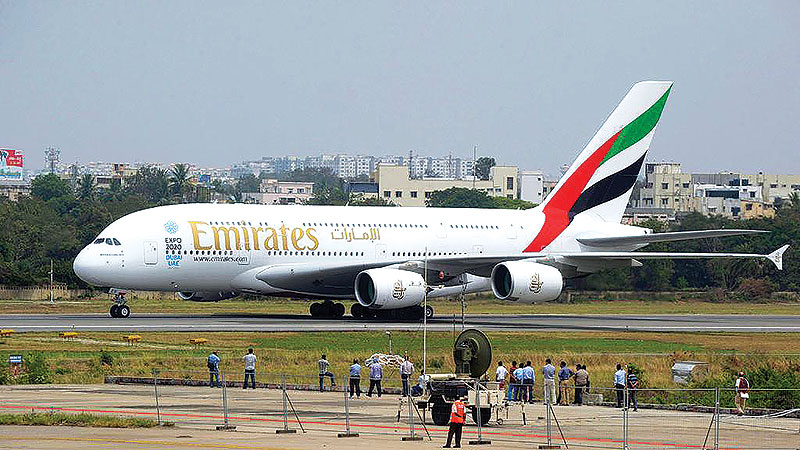IndiGo, Qatar Airways sign codeshare agreement
DUBAI: Emirates Airline, the largest carrier in the Middle East, yesterday reported a 282-percent rise in half-year net profits, mainly thanks to a drop in operating costs and fuel prices. The result was a change of fortunes for the Dubai carrier, which for the full-year to the end of March took a heavy hit from high oil prices and currency fluctuations. The carrier said it posted a net profit of $235 million in the first six months of the current financial year compared to just $62 million in the same period last year. The airline attributed the soaring profits to a sharp drop in the cost of fuel which accounts for almost a third of company spending.
An eight-percent drop in operating costs and a rise in the number of passengers per flight also contributed to the healthy results. "The lower fuel cost was a welcome respite as we saw our fuel bill drop by AED 2.0 billion ($545 million) compared to the same period last year," Sheikh Ahmed bin Saeed Al-Maktoum, Chairman and CEO of Emirates Airline and Group, said in a statement.
"However, unfavourable currency movements wiped off approximately AED 1.2 billion ($327 million) from our profits," Sheikh Ahmed said. On average, fuel costs were 13 percent lower compared to the same period last year, the airline said. In the last full year, Emirates' net profit dived 69 percent to just $237 million due to high oil prices and currency fluctuations.
"The global outlook is difficult to predict, but we expect the airline and travel industry to continue facing headwinds over the next six months with stiff competition adding downward pressure on margins," Sheikh Ahmed said. The airline said its revenue in the April to September period dropped three percent to $12.9 billion compared to $13.3 billion in the same period last year.
Emirates carried 29.6 million passengers in the six-month period, down two percent. The airline serves a global network spanning over 158 destinations in 84 countries. Its fleet stands at 267 large aircraft, including over more than 100 Airbus 380 superjumbos.
Code-share deal
India's IndiGo announced a codeshare agreement with Qatar Airways yesterday, just days after ordering 300 Airbus planes, as the low-cost airline boosts its foreign ambitions and the Gulf carrier taps into the booming domestic market. The agreement will allow Qatar Airways to put its passengers on the Indian carrier's flights between Doha and Delhi, Mumbai and Hyderabad.
India's aviation industry has seen tremendous growth in recent years, recording an increase of 18 percent in the numbers of flyers in 2018 with nearly 140 million people flying domestically.
IndiGo-which placed orders for 300 A320neo family aircraft worth over $33.2 billion in late October-is the largest low-cost private airline in the South Asian nation with some 47 percent of local market share. But the airline has been dogged by a corporate governance dispute between co-founders Rakesh Gangwal and Rahul Bhatia that has stoked investor concerns.
Shares in IndiGo's parent company InterGlobe Aviation were up by almost two percent in Mumbai after the announcement. The codeshare agreement could set "the stage for a possible future alliance," editor of website Bangalore Aviation website, Devesh Agarwal, said.
Qatar Airways has been keen to tap into the fast-growing market, but is not allowed to start a new carrier in India due to local ownership rules. Chief executive Akbar Al Baker told the Press Trust of India that Qatar Airways was "interested in buying stake in IndiGo, but this is not the right time as issues among promoters are yet to be resolved".
Despite the growth in passenger numbers, high operating costs, including rising fuel prices and a decline in the Indian rupee's value against the dollar, have hit the industry hard. IndiGo registered a loss of 10.7 billion rupees ($150 million) in the last quarter ending September. -AFP










